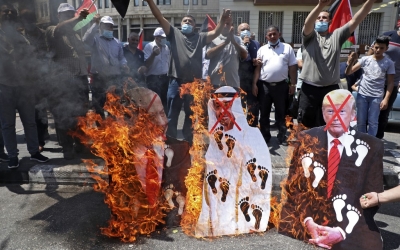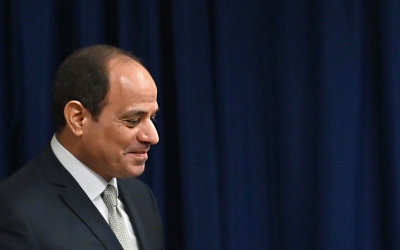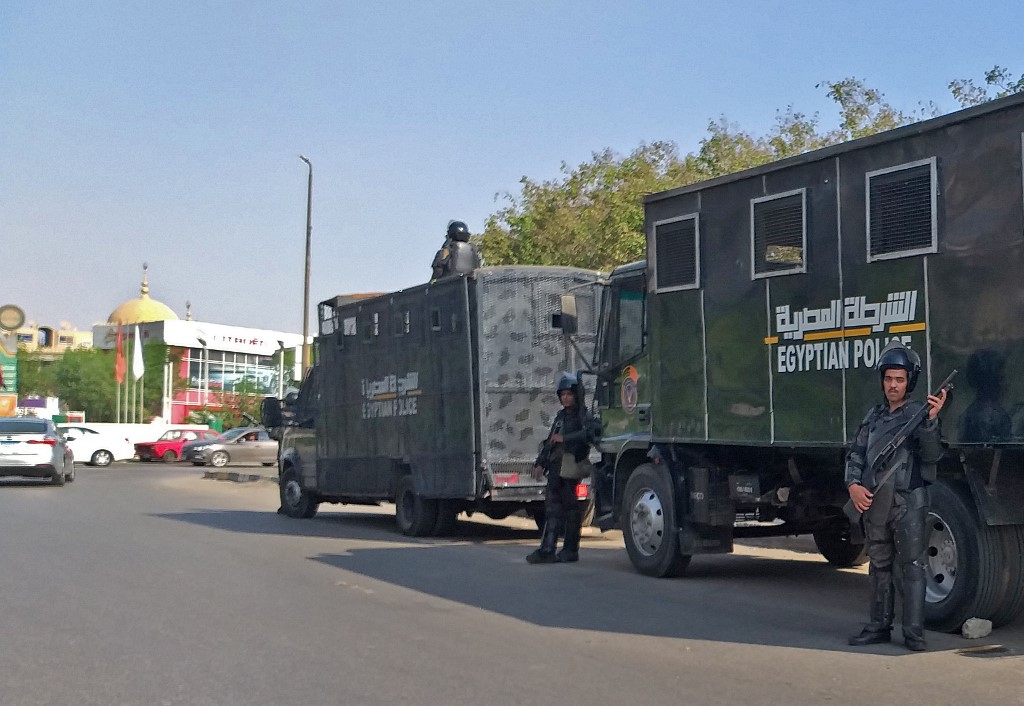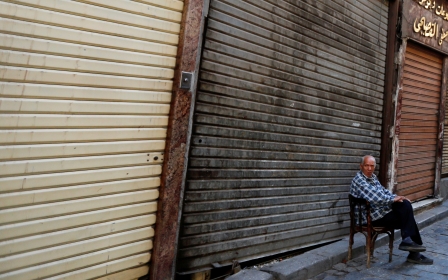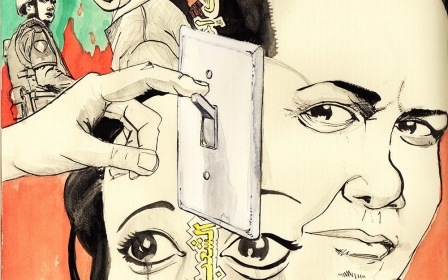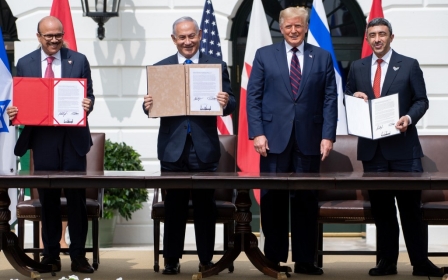Israel's deals with the Gulf are a disaster for Egypt
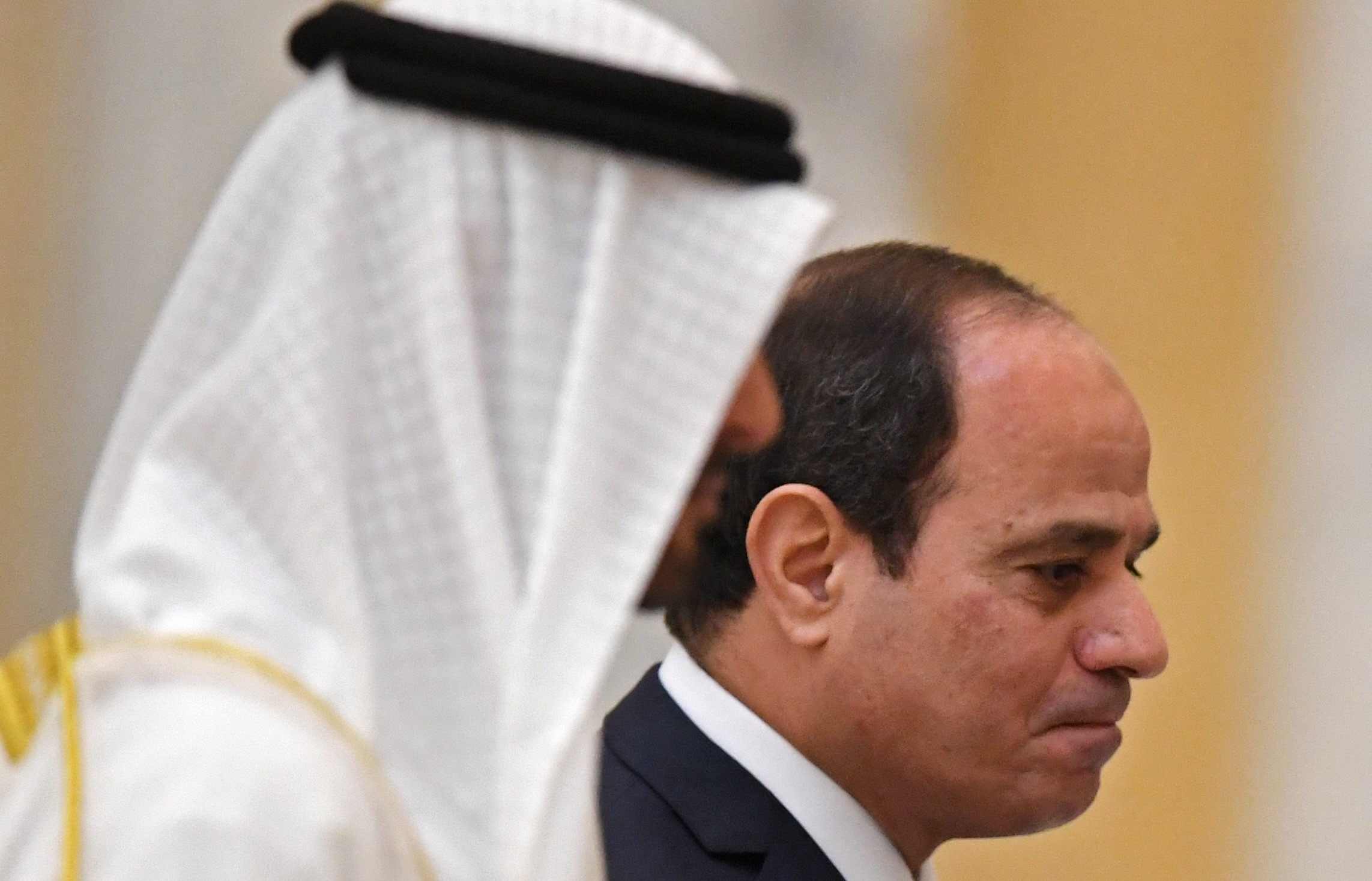
When the UAE and Bahrain officially normalised relations with Israel on 15 September, US President Donald Trump hailed "the dawn of a new Middle East".
Egypt is today waking up to what this new era spells for it. There are two types of disaster for Egypt contained in the implicit bid of the UAE to become Israel's main Arab trading partner - both prospective and immediate disasters.
Overnight, Sisi's canal will be undercut by a cheaper means of getting oil from the Red Sea to the Mediterranean
To start with the long-term peril first, a desert oil pipeline that was once operated as a secret joint venture between the Shah's Iran and Israel could play a big role in connecting the Arab pipeline grid to the Mediterranean. The 254-kilometre Europe Asia Pipeline Company's pipeline system runs from the Red Sea to the Israeli port of Ashkelon.
Along with the pipeline, Dubai's state-owned DP World is partnering with Israel's DoverTower to develop Israeli ports and free zones, and to open a direct shipping line between the Red Sea port of Eilat and Dubai's Jebel Ali port.
Neither the pipeline nor the port link-up is good news for the Suez Canal, which Egyptian President Abdel Fattah el-Sisi just spent $8bn widening. That includes the money he forced Egyptian businessmen and ordinary shareholders to put into the doomed project. Overnight, Sisi's canal will be undercut by a cheaper means of getting oil from the Red Sea to the Mediterranean.
There are other, more immediate perils for his regime. With the normalisation deal, Cairo loses the role it enjoyed for decades of mediating relations between Arab states and Israel. With that came ownership of the so-called Palestinian card as Egypt was the reference point for all Palestinian factions - arranging ceasefires between Israel and Hamas in Gaza, or reconciliation meetings between Fatah and Hamas in Cairo. It is significant that the latest attempt to reconcile Fatah and Hamas took place in Ankara not Cairo.
For commentators such as Mohamed Ismat, writing in Shorouk News, the loss of Egypt's status goes even further: "The entire Arab national security system, with all its military, political and economic dimensions, will be utterly dismantled. All Arab world rhetoric about freedom, unity and independent development will be ossified and stored in warehouses," he writes.
"Throughout the years of confrontation with Israel, Egypt played the main role in determining the Arab reactions despite its disagreements with this or that Arab state. However, this situation will not continue. Israel aspires to replace Egypt and lead the Arab region according to new equations that will bring down all the institutions of common Arab action, foremost among them the Arab League itself."
Game changer
Along with status, Egypt is losing hard cash. Both Saudi Arabia and the UAE have stopped funding Sisi's military dictatorship, into which they had poured billions of dollars. Saudi Arabia has stopped funds and oil going to Egypt because of its balance-of-payments crisis, and Abu Dhabi Crown Prince Mohammed bin Zayed has found more inviting baubles to play with. Pouring money into the bottomless pit of Sisi's pockets must seem so much like yesterday.
Of particular interest to Israel is the Mubadala Investment Company in Abu Dhabi, one of the UAE's sovereign wealth funds worth $230bn. One Israeli academic who has spent time in Abu Dhabi called this fund a "game changer" for Israeli high tech.
But the prospect of Emirati investment switching from Egypt to Israel is already changing the game for some businessmen in Cairo. Salah Diab, the founder of Al-Masry Al-Youm newspaper, has been arrested before for the alleged violations of companies he owns. But his latest arrest was different: Diab is being held in jail pending further investigation, and there is every indication that prosecutors have been instructed to keep him there.
It has not been lost on Abu Dhabi that Diab is the maternal uncle of Yousef al-Otaiba, the Emirati ambassador who played a key role in pre-announcing the normalisation deal.
The last time Diab was arrested in 2015, Otaiba intervened and his uncle was soon released. Sisi is not listening this time. Showing that Diab's legal problems are more serious this time, the text of the tape of an alleged dinner conversation between Diab and one-time presidential candidate Ahmed Shafiq was released on a social media site that bears the name of another former high-ranking general, Sami Anan. Anan was released on house arrest last December after serving two years of a nine-year prison sentence.
Both Shafiq and Anan fell foul of Sisi, the former being forced to withdraw as a candidate in the 2018 election and the latter serving a two-year prison sentence.
Legal problems
On the tape Shafiq, a former airforce pilot, is contemptuous of Sisi, whom he describes as "a naive army officer, one in charge of an infantry... he never learned how to deal cleanly".
Diab replies, laughing: "You are also an army officer, Mr Lieutenant General... You certainly understand him." Shafiq then says: "There is a difference... of course, and you know, Mr Salah, not all those in the army are the same."
Now, Diab is in prison and Shafiq has a legal action against him reactivated, contrary to the agreement Egypt made with the UAE, where Shafiq fled when former president Mohamed Morsi took over in 2012. For exiled Egyptian politicians who keep a close eye on battles back home, there is no doubt at which Gulf state Diab's and Shafiq's legal problems are aimed.
Ayman Nour, leader of the Ghad El-Thawra Party and a former presidential candidate, said the arrest of Diab "reflects the state of disagreement between Egypt and the UAE after normalisation [with Israel]".
Middle East Eye has learned that another Emirati businessman who was trying to set up a media company in Cairo was detained by Egyptian authorities, and only released after the personal intervention of Tahnoun bin Zayed, Mohammed bin Zayed's brother.
Forcing the poor to pay
The loss of Gulf billions has hit Sisi hard. He has already gone to the International Monetary Fund, instituted austerity, and shaken down his richest businessmen. He is now left with no other choice but to tax his citizens. Being the man he is, he is making Egypt's poorest pay first. Egypt's national debt has nearly tripled since 2014, from about $112bn to about $321bn.
In Asyut governorate, 67 percent of inhabitants live under the poverty line of 736 Egyptian pounds ($47) a month. As economist Mamdouh al-Wali explains, that figure is unrealistic considering the soaring costs of living, and the real poverty rate is surely higher.
This figure was from the fiscal year 2017-18, at which time the poverty rate in the southern Sohag governorate reached 60 percent, while in Luxor and Minya it reached 55 percent. Officials have admitted that the figures were modified twice, Wali says, amid government concerns over revealing the true scale of poverty.
It's little wonder, then, that these villages have seen an unprecedented, but as yet peaceful, series of anti-government protests. People simply could not take any more
Despite the hardships in these provinces, Sisi ploughed on, raising prices for electricity, drinking water, natural gas and public transport.
Another lucrative ploy: demolishing houses with no planning permission - in some cases, family homes that have stood for decades. Owners can avoid demolition if they pay the government a fee of 50 Egyptian pounds per square metre for residential homes in rural areas; in other areas, the fee for commercial buildings rises to 180 Egyptian pounds per square metre.
The downturn has led to a halt in construction, with many workers who seek day labour forced to stay at home. Public transport has also become increasingly less accessible. On trains, the most frequently used method of transport between Upper and Lower Egypt, for example, passengers have seen fares of freight transport raised to between 12 and 140 Egyptian pounds per box, depending on the weight and the distance travelled by the train.
Waves of protest
It's little wonder, then, that these villages have seen an unprecedented, but as yet peaceful, series of anti-government protests. People simply could not take any more.
When exiled whistleblower Mohamed Ali urged Sisi's opponents in the country to take part in a "day of rage" to demand the president's departure, he himself was surprised at what happened: six days of protest in more than 40 villages, despite a heavy security clampdown.
Ali's message was simple. A president who boasts about the number of palaces he had built for himself (with Ali's help) will not even let the poor live in their houses without threatening to demolish them.
Egypt's new protesters are - as yet - quite unlike the revolutionaries of 2011. They have no leader and no political slogans. They are conservative and religious, but not organised by the Muslim Brotherhood. The brave revolutionaries of 2011 came from the city and largely, but not wholly, the upper middle class. Many had degrees.
Today's protesters come from the ranks of the uneducated and poor, and many are younger than the 2011 wave. As Abdul Rahman Yusuf, the son of Sheikh Qaradawi, the Muslim Brotherhood cleric in Qatar who is himself a secular liberal, wrote: "The regime is facing an enraged citizenry that does not see it as legitimate. This is a direct confrontation. There's hardly anyone negotiating on behalf of these simple commoners who are defending themselves against a herd of rabid hyenas."
'I'm going to die anyway'
Of the many interviews with villagers, one is particularly poignant. Nafisa Atiya Mohammed, who lives in a shack threatened with demolition, says: "Here you go, you can see the exposed ceiling beams. I can't find anyone who can help me cover it with plastic sheets in the area. I sell scraps for one, five, 10 pounds until I get dizzy from the heat."
Asked how much money authorities have requested, she responds: "They said 1,000, then over two to four years, 4,000. Where will I get it from?" She does not have anyone who could lend her enough money to allow her to remain in the house, the report notes.
"I was going around yesterday, going from home to home, looking for someone to lend me money... I have a pension, but I swear to God it's not enough," Mohammed says. "Water is 150 and electricity is 550 a month. The receipts are inside, you can see. They can go and take my home. I'm going to die anyway. I’ll just leave it for them." The interview ends with the journalist breaking down in tears.
Sisi cannot afford to let this protest spread. Egypt will only take so much mismanagement and corruption, and the point is fast arriving when popular anger will be turned on the regime itself. Many of these villagers are, by tradition, armed - and they will act on tribal codes of revenge if fired on by the army or police. So far, their protests have been peaceful.
This brutal, callous and ruinous military regime was installed by the Emirati and Saudi royal families. Sisi would not have broken ranks and betrayed the president, Morsi, who picked him as defence minister, had it not been for the cash Riyadh and Abu Dhabi promised him.
If they lose Sisi and Egypt as a whole, their plans for regional domination will soon crumble. Then, the region would indeed have reached a turning point - but not the one that either Mohammed bin Zayed nor Israeli Prime Minister Benjamin Netanyahu had been planning.
The views expressed in this article belong to the author and do not necessarily reflect the editorial policy of Middle East Eye.
This article is available in French on Middle East Eye French edition.
Middle East Eye propose une couverture et une analyse indépendantes et incomparables du Moyen-Orient, de l’Afrique du Nord et d’autres régions du monde. Pour en savoir plus sur la reprise de ce contenu et les frais qui s’appliquent, veuillez remplir ce formulaire [en anglais]. Pour en savoir plus sur MEE, cliquez ici [en anglais].



